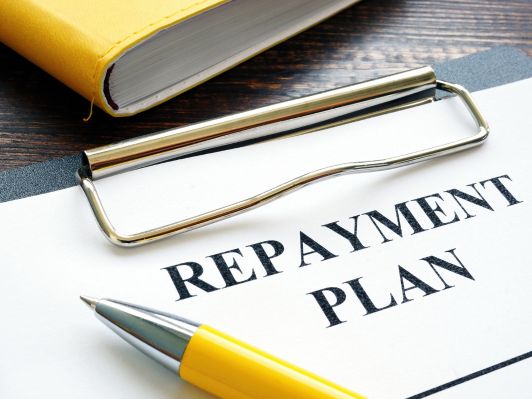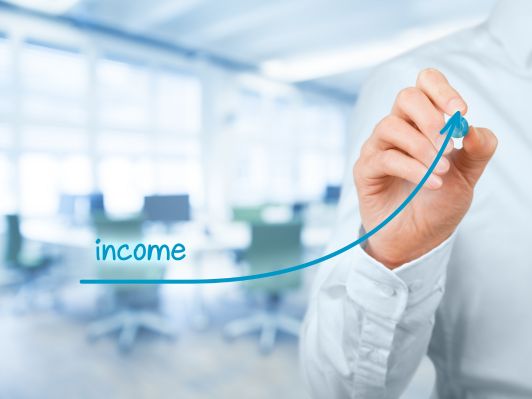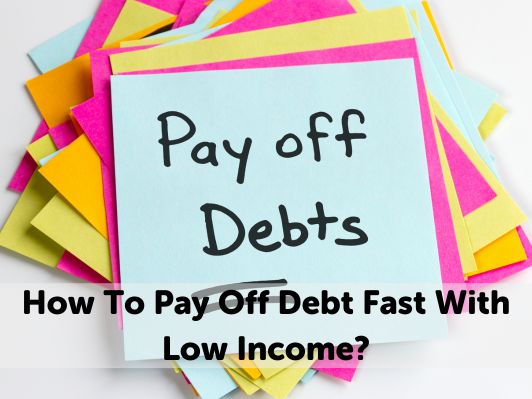Debt affects more than just your wallet. It can take a toll on your mental health too. According to the Office of National Statistics, 22% of people using credit or loans more often than usual reported low happiness levels.
But here’s the good news – you can learn how to pay off debt fast with low income by following some proven strategies.
Learning how to pay off debt fast with low income breaks down into three key steps:
- Saving more money
- Reducing your debt through debt consolidation, debt relief, and other measures
- Tackling your debts strategically with the right approach
Practical Strategies To Save More Money To Pay Off Debt Fast
1. Avoid Taking On New Debt
The first rule to get out of debt is to stop digging the hole deeper. Put major purchases on hold. With credit cards, only spend what you can pay back each month. Taking on new debt while trying to pay off existing debts will only make your journey longer and harder.
2. Find Out Exactly How Much Debt You Owe
You can’t tackle a problem you don’t fully understand. To get out of debt fast, you need to know exactly how much you owe.
- Make a list of all your debts – personal loans, short term loans, mortgages, credit card debt, and money borrowed from friends or family
- Note the interest rate for each debt
- Check your credit report to make sure you haven’t missed anything
Once you know how much debt you have, you can create a plan to pay it off.
3. Create a Repayment Plan

A clear debt repayment plan increases your chances of success. Write down:
- The minimum payments you must make each month
- Your monthly income
- The difference between your income and required payments
This gap shows how much extra money you can put toward paying off your debts. If you’re not saving enough, you’ll need to either cut expenses or boost your income.
4. Cut Down Your Living Expenses
When you have low income, finding ways to save money becomes crucial to pay off debt fast. Review your bank statements and track where your money goes each month. Group expenses into categories like:
- Rent
- Food
- Transportation
- Entertainment
- Clothing
After seeing where your money goes, look for ways to cut back:
- Move to a smaller flat to save on rent
- Find a flatmate to split housing costs
- Buy clothing from thrift or budget stores
- Find free or low-cost recreation (hiking, parks, picnics)
- Work out at home instead of paying for a gym
- Cancel subscriptions you rarely use
Every pound saved can go toward paying off your debts.
5. Increase Your Income

You can only cut expenses so far. The fastest way to pay off debts is often to earn more money. With more income, you can make larger debt payments.
Try these ways to boost your income:
- Take an extra shift at your current job
- Ask for a raise or promotion
- Look for a higher-paying job in your field
- Turn hobbies into side income (selling art, freelance writing)
- Get a weekend job at a local shop or restaurant
Even small amounts of extra income add up when applied to your debt.
6. Get Help From the Government
The UK government offers support for people with low income. Check what benefits you might qualify for:
- Universal Credit: Helps with living costs if you’re out of work or earning a low income
- Local council help: Your local council may assist with energy bills, water bills, and food costs
Each local council has different eligibility rules. Check with yours to see what help is available.
7. Improve Your Credit Score
A poor credit score often means paying higher interest rates. With high interest, your minimum payments might only cover interest without reducing the principal.
Even with low income, you can improve your credit score:
- Pay all bills and loan instalments on time
- Keep credit utilisation low (aim to use less than 30% of your credit limit)
- Register on the electoral roll
- Check your credit report for errors
A better credit score may help you negotiate lower interest rates, which helps you pay off debt faster.
8. Build an Emergency Fund
While focusing on debt payoff, don’t forget to build an emergency fund. Without this safety net, any unexpected expense could force you to take on more debt.
Ideally, an emergency fund should cover six months of essential expenses. With low income, start smaller:
- Begin with a £1,000 emergency fund
- Then work toward one month of essential expenses
- Eventually build to three months of expenses
Having an emergency fund prevents you from relying on credit cards or loans when surprises happen.
9. Track Your Progress and Adjust Your Plans
No debt repayment plan is perfect from the start. Track your progress using apps, spreadsheets, or a notebook. Watch for changes in:
- Interest rates
- Laws affecting debt
- Inflation
- Your income or expenses
When circumstances change, adjust your debt repayment plan accordingly.
10. Seek Independent Advice
Not sure how to get out of debt fast? Many UK services offer free, independent, and confidential debt advice. These experts can:
- Review your financial situation
- Suggest debt relief options
- Help create a personalised plan
- Negotiate with creditors on your behalf
Don’t hesitate to ask for help if you feel overwhelmed.
Two Proven Methods to Get Out of Debt Quickly
When facing multiple debts with different amounts and interest rates, where should you start? Two popular approaches can help you pay off debt fast:
1. Debt Snowball Method
The debt snowball method focuses on quick wins to build momentum:
- List all your debts from smallest to largest balance
- Make minimum payments on all debts
- Put any extra money toward the smallest debt
- After paying off the smallest debt, move to the next smallest
This method provides psychological wins as you see debts disappear one by one. It’s great for staying motivated, especially if you struggle with discipline.
2. Debt Avalanche Method
The debt avalanche method saves you more money in the long run:
- List all your debts from highest to lowest interest rate
- Make minimum payments on all debts
- Put any extra cash toward the highest-interest debt
- After paying that off, move to the next highest interest rate
By tackling high-interest debt first, you pay less interest overall. This method is mathematically optimal but may take longer to see visible progress.
Choose the approach that fits your personality. Need motivation? Try the snowball method. More concerned with saving money? The avalanche method might be better.
Debt Relief Options and Debt Consolidation to Pay Off Debts
If you’re struggling with monthly payments, consider these debt relief options:
1. Debt Consolidation Loans
A debt consolidation loan combines multiple debts into one new loan. Benefits include:
- One monthly payment instead of many
- Potentially lower interest rate
- Simplified debt management
- Fixed timeline for becoming debt-free
Consolidating debts can make it easier to stay on track with payments. However, you’ll need a decent credit score to qualify for a good interest rate. It important to remember that consolidating debt can reduce monthly payments, but can take you longer to pay back and you may pay more in the long run.
2. Debt Management Plans (DMP)
With a debt management plan, a company works with your creditors to create an affordable payment plan. You make one payment to the DMP provider, who distributes it to your creditors.
DMPs work well for unsecured debt like:
- Credit card balances
- Personal loans
- Payday loans
- Overdrafts
- Other non-priority debts
Many creditors will reduce or waive fees and interest charges when you enter a DMP.
3. Debt Settlement
Debt settlement involves offering creditors a lump sum that’s less than the full amount you owe. For example, you might offer to pay 80% of your outstanding balance to settle the debt completely.
This approach can:
- Reduce your total debt amount
- Help you get out of debt faster
- Provide a clean break from creditors
However, it requires having enough money for the lump sum payment and may affect your credit score.
4. Individual Voluntary Arrangement (IVA)
An Individual Voluntary Arrangement is a formal agreement between you and your creditors. You make regular payments to an insolvency practitioner who distributes the money to your creditors.
An IVA:
- Typically lasts 5-6 years
- Freezes interest and charges
- Stops creditor action against you
- Writes off remaining debt at the end of the term
This is a serious step that impacts your credit report for six years. Seek professional advice before pursuing an IVA.
5. Filing for Bankruptcy
If all other options are exhausted, bankruptcy provides a fresh start. Your assets are divided among creditors, and most remaining debts are written off.
Bankruptcy has serious consequences:
- Stays on your credit report for six years
- May require selling valuable assets
- Can affect future borrowing
- Could impact certain jobs
Apply for bankruptcy online through the UK Government’s website.
6. Debt Relief Order (DRO)
A Debt Relief Order pauses debt payments for 12 months. After this period, debts are often written off if your situation hasn’t improved.
You may qualify for a DRO if:
- You owe less than £30,000
- You don’t own a home
- Your spare income is less than £75 per month
- You have few valuable assets
A DRO is less severe than bankruptcy but still impacts your credit rating.
Summary: Your Path to Being Debt-Free
Being in debt while earning a low income is challenging but not impossible to overcome. By using the strategies in this guide, you can get out of debt and improve your financial health:
- Avoid new debt
- Know exactly what you owe
- Create and follow a repayment plan
- Cut expenses and increase income
- Get help when needed
- Choose a debt payoff strategy that works for you
- Consider debt relief options if necessary
The journey to becoming debt-free requires patience and discipline, but the peace of mind is worth the effort. Start taking control of your debts today for a more secure financial future.
Frequently Asked Questions
How long will it take to pay off my debts with a low income?
The timeline depends on how much debt you have, your interest rates, and how much extra money you can put toward debt payoff each month. Many people can make significant progress in 1-3 years with consistent effort.
Should I use my savings to pay off debt?
Keep a small emergency fund (£1,000-£2,000) while paying off high-interest debt. Having this safety net prevents you from going back into debt when emergencies arise.
What is the best way to stay motivated while paying off debt?
Track your progress visually, celebrate small wins, find a debt-free community for support, and remember why you’re working so hard to get out of debt.
Can I get out of debt without changing my spending habits?
Probably not. Most successful debt payoff journeys require examining and changing spending habits to free up money for debt payments.
Is debt consolidation right for me?
Debt consolidation works best if you have multiple high-interest debts, a good enough credit score to qualify for a lower interest rate, and you’ve addressed the spending habits that led to debt in the first place.
Disclaimer: This article is for informational purposes only and does not constitute financial advice. Please consult with a qualified financial advisor before making decisions about your debts.

